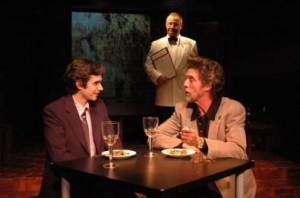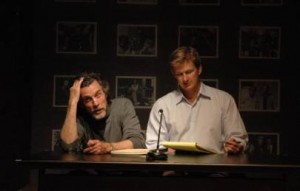
Though the coming out/coming of age story has been told time and again, it
is one that bears retelling, especially when told as freshly and smartly as
Jonathan Tolins does it in Secrets Of The Trade, now playing at the Black
Dahlia Theatre. Tolins’ play is, as well, a perfect example of why L.A. theater,
especially theater of the “waiver” variety, can hold its head high and proud
amidst any theatrical community. It is no wonder that Tony-winning multiple-
Broadway-shows-to-his-credit John Glover has chosen to appear in a tiny
theater on Pico Blvd. A production as fine as this one gives Glover a role he
was, as they say, born to play and surrounds him with talent worthy of any
Broadway stage.
Tolins, who also wrote the powerful Twilight Of The Golds, recounts the tale of
Andy Lipman, a 16-year-old theater geek (the gifted Edward Tournier) who
one day writes a letter to his idol (Glover as 6-time Tony winning actor/director
Martin Kerner) and two years later gets a response which alters the course of
his life. We follow Andy, his parents (the divine Amy Aquino and the
wonderfully folksy Mark L. Taylor), and Kerner’s acerbic assistant Bradley (the
always watchable Bill Brochtrup) through the decade of the 80s as Andy
moves from gifted, gawky teen to successful and self-assured adult. Secrets Of
The Trade feels like a favorite movie, one that you plop into your DVD player
and watch again and again. It is cinematic in the best sense of the word, and
yet very theatrical (also in the best sense), thanks to director Matt Shakman,
his superb cast, and a design team that once again makes the tiny Black
Dahlia theater look like a million bucks.
Andy may be young when Secrets begins, but he is hardly lacking in chutzpah.
In the letter he has written to Kerner in hopes of becoming his assistant, Andy
informs him that “my father says you can use my help.” Andy saw his first
Broadway show (Kerner’s Flash In The Pan) at age 7 and he’s been hooked (on
theater and on Kerner) ever since. Andy’s mother Joanne worries about
Andy’s letter to Kerner. There’s been “talk” about the man, and as we later
learn, Joanne has suspicions that her son and Kerner may be “different” in the
same way.
Tolins knows how to be funny without crossing the line into sitcom humor. Take
for example one of Kerner’s credits, Disraeli: The Musical. (Imagine that one!)
Or Andy’s telling Kerner that “I always planned a life in the theater. I made my
parents throw my first birthday party at Sardis.” Or when Kerner tells the
impressionable teen that “good theater has to hit you in your head, your
heart, and your dick,” and Andy responds, “Do you think I’m leaving one of
them out.”
The latter exchange is just the kind that Andy’s mom has been worrying
about. She, and we in the audience, can’t help wondering why this older
(and obviously gay) man is showing such interest in a clearly adorable and
desirable teen. Is it just coincidence that Kerner waited until Andy was “legal”
to answer his letter? It is to Tolins credit that he never allows Kerner to become
a gay cliché. In fact, he has created not just one but three very real, very
rounded gay characters. I particularly liked Andy’s parents’ quite different
responses to suspicions that their only child is gay—mom Joanne wondering
aloud if perhaps he just might be and dad Peter countering that “until he says
something, we don’t know.” (I wonder how many times a day this
conversation is uttered in American homes.)
There’s also a still relevant argument late in the play between Andy and
Kerner regarding Kerner’s refusal to come out publicly, Andy urging him to
become a role model to gay teens, Kerner protesting that only people who are
ready to hear the truth ought to be told. It is to Glover and Brochtrup’s
immense credit that neither actor lives in Kerner’s closet.
Tournier perfectly captures Andy’s wide-eyed innocence, gradually allowing
him to become older, more confident, and wiser, so that by play’s end, we truly
feel that we are seeing a 10-years-older version of the sweet-16-year-old we
met at curtain up. Aquino follows her fine recent turn in A Feminine Ending
with an even better one here. Her Joanne is a mother willing to defend her
son like a tigress, yet someone who also understands his hopes and dreams.
(She was a dancer who once auditioned for Kerner “in another life.”) Aquino
also delights in a cameo as raspy-voiced “legendary agent” Florence. The
actress is perfectly complemented by Taylor’s ingratiating work as Andy’s dad,
a cousin to TV’s Mr. Rogers, and like Aquino, he gets to play several roles, all of
them splendidly. Brochtrup once again proves (as he did in Theater District,
Pera Palas, Small Tragedy, and the recent Tonight At 8:30) that he is one of our
most talented and interesting actors. A lesser actor might have played
Bradley as nothing more than the “gay assistant” stereotype. Brochtrup plays
the man.
Finally, there is Tony-winner Glover playing Tony-winner Kerner, and so
magnificently that were this show running on Broadway, he’d likely be a shoo-
in for another. Glover is perhaps best known for portraying good and evil twins
James and John Jeckyll in both stage and film versions of Terrence McNally’s
Love! Valour! Compassion!. Complex characters each of them, neither holds a
candle to the complexity of Kerner, who combines the qualities (good and
bad) of both. Is Kerner mentor, inspiration, seducer? In Glover’s beautifully
nuanced performance, we see elements of all of the above. His best of many
great moments comes in an exquisitely written and performed speech to
Joanne about what exactly it is that the 60ish Kerner gets from the 20ish
Andy. Brilliant.
As he did in Tryst (the Black Dahlia’s award-winning long-running hit of last
year), set designer Craig Siebels has created a set which makes the best, and
most creative, use of the Dahlia’s long, narrow stage. Downstage becomes
the Lipmans’ Massachusetts home (among other locations) while upstage
serves mostly as Kerner’s office. In one particularly inspired moment, Tolins’
script, Siebels’ set, and Mike Durst’s outstanding lighting design all come
together to splendid effect. As Andy stands downstage and tells us (quoting
from his letter to Kerner) that “I didn’t even know what a scrim was,” the lights
go on upstage revealing Kerner reading Andy’s letter and we see that the
wall in front of which Andy is standing is in fact a scrim. Another great
script/direction/set/lighting moment occurs as we follow Andy and Kerner on a
walk from his upstage office to a café which has miraculously appeared
downstage in the dark as Durst’s lighting has kept our attention on the two
men walking. Also doing excellent work are Joel Spence (sound designer),
Elizabeth Brooks (costume designer) and Michele Miatello, who designed the
projections which allow the set to become a swank restaurant, a New York
park, and a California palm tree lined street among other locales.
Director Shakman, who is also Black Dahlia’s Artistic Director, can be justly
proud of his work here, of the performances he has elicited from his cast, and of
the overall high quality evident in every aspect of this production. Like others
before it, Secrets Of The Trade is likely to be settling into a long and very
popular run at the Dahlia.
Black Dahlia Theatre, 5453 West Pico Blvd., Los Angeles.
–Steven Stanley
March 20, 2008
Photos: EB Brooks




 Since 2007, Steven Stanley's StageSceneLA.com has spotlighted the best in Southern California theater via reviews, interviews, and its annual StageSceneLA Scenies.
Since 2007, Steven Stanley's StageSceneLA.com has spotlighted the best in Southern California theater via reviews, interviews, and its annual StageSceneLA Scenies.







 COPYRIGHT 2024 STEVEN STANLEY :: DESIGN BY
COPYRIGHT 2024 STEVEN STANLEY :: DESIGN BY